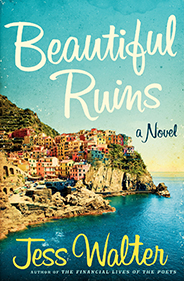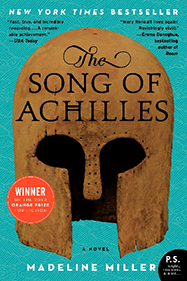by David Abrams
Buy on NOOK »-
March 14, 2013
Opening Round
-
Jess Walter
2Beautiful Ruins
v.
3The Song of AchillesMadeline Miller
-
Judged by
Tony Horwitz
My draw in the first round of this book tournament is a literary Greco-Roman wrestle. In one corner, a tale of ancient Greece; in the other, an Italian romance. Achilles and Hector duel in the former, Marc Antony and Cleopatra bicker in the latter. That’s as far as I’ll go with this strained analogy, except for a word about the referee. Unlike Madeline Miller, who teaches Latin and ancient Greek, I’m neither a student nor a fan of antiquity. Since toiling through Homer and Sophocles in college, I’ve avoided ancient literature, and am only mildly less allergic to Ionic columns and naked men dancing on urns. I’m an AD, not a BC, guy.
So The Song of Achilles is a book I’d never have cracked on my own, and I did so for this contest with undergraduate dread. The first chapters of the novel confirmed my prejudice. Miller recasts the familiar Greek legend by telling it through the eyes of Patroclus, an exiled prince who becomes the boyhood companion of Achilles and then his lover. The youths are tutored by a centaur and harassed by Achilles’s meddlesome mother, a scary sea nymph whose mouth is “a gash of red, like the torn-open stomach of a sacrifice.” There’s lots of strumming lyres, stilted pseudo-ancient dialogue, and romance-novel groping. (“My hand reached, found the place of his pleasure. His eyes closed.”)
Pulpy prose and mythic creatures aside, I didn’t believe the relationship at the heart of the story, or initially care much about it. Why would the half-god, golden-haired Achilles (cue Brad Pitt in Troy) befriend and then bed Patroclus, who by his own account is a clod? Their pillow talk isn’t convincing, either. Fated to be a warrior-hero, Achilles complains to his lover, “They never let you be famous and happy.” Cue Brad Pitt again.
But a funny thing happened on the way to Troy. In the second half of the book, as the youths set off with a Greek armada to reclaim Helen, the novel takes sail. Miller is much better at battle than love scenes, and her retelling of the years-long siege of Troy is taut, visceral, and heartrending (in fact, a potent piece of anti-war writing). In the camp scenes, slick-tongued Odysseus, hulking Ajax, and brutish Agamemnon came alive for me as never before. There’s also a nice reversal in the love story. Gorgeous, gifted Achilles becomes peevish and cruel, while plodding Patroclus grows into a mensch, skilled at medicine. I wanted him to ditch the proud Greek for his new soulmate, a captive Trojan, even though I knew the die was cast. In short, a satisfying tragedy.
It’s a mark of Miller’s skill that a reader as classics-averse as me raced through this book (at least the second half) and finished it with an urge to revisit the Iliad. The Song of Achilles is also Miller’s first novel and winner of the Orange Prize, so all in all, a deservedly garlanded debut.
My reading of Jess Walter’s Beautiful Ruins traced a very different arc. The book had been highly recommended by friends and it captivated me from the start. The novel opens in 1962, during the filming of Cleopatra, when an American starlet leaves the movie set in Rome for a faded fishing village up the coast. There, she checks into “The Hotel Adequate View” and befriends its young proprietor, Pasquale. Their brief intimacy becomes the core of a story that travels between 1960s Italy and present-day Hollywood, with a number of colorful side trips.
Braided narratives often disappoint me; one strand tends to work better than others, and the ties between them often feel contrived. But Walter is masterful at interlacing storylines, and he draws characters so indelibly that I was engrossed by all of them (even a grotesque studio exec whose face has been so altered by cosmetic treatment that discerning its original contours is like “standing on Wall Street trying to understand the topography of Manhattan Island before the Dutch arrived”). Walter also excels at mixing pathos and comedy. The poignant musings of the innkeeper Pasquale, a trapped dreamer, are leavened by the smutty banter of his aged aunt, whose gynecological Italian insults are met with a smile and a thank you from the uncomprehending American actress. Meanwhile, in Hollywood, a young idealist named Claire struggles to quit a loser boyfriend and a soul-destroying job listening to reality-TV and movie pitches. For instance, “an effects-driven period thriller” about a Western pioneer “whose family gets eaten by a fat German.” Claire’s boss greenlights the project.
These and other set pieces are so vivid and funny that I felt the novel lose steam midway through, when Walter introduces another major character—a dissipated rocker—and leaves sunny Italy and California for Seattle and Scotland. These episodes are organic to the plot, but by being merely good, they dilute the pace and power of an otherwise virtuoso performance. My other, fairly minor gripe about Beautiful Ruins may sound perverse. The book is too sweet (rather like The Art of Fielding, a not-dissimilar novel I enjoyed last year). While The Song of Achilles stays true to its tragic roots, Beautiful Ruins touches movingly on dark themes—addiction, abandonment, war loss, thwarted dreams—and then backs off. Having mocked the movie business for 300 pages, Walter concludes with a feel-good Hollywood ending.
I’m tempted to do the same with this tournament and somehow find a way to declare both The Song of Achilles and Beautiful Ruins winners. Or, in the spirit of Greco-Roman wrestling, to end their match with a disqualification—of me, the referee, for implacable bias against centaurs and Spartans. But life isn’t fair and neither are book contests. So this round goes to Beautiful Ruins, one of the best-crafted and most pleasurable novels I’ve read over the past year.
Match Commentary
By Kevin Guilfoile & John Warner
John: I am a Jess Walter fanboy, so I’d been looking forward to Beautiful Ruins for quite some time. He writes in a register I just respond to: funny, but also not afraid of sentiment.
He writes the kind of books I’d like to write about things I’m interested in, and if I didn’t enjoy them so much, I’d be some combination of pissed and jealous.
Unlike Tony Horwitz, I’m even a fan of braided narratives. Even when they’re not as well integrated with each other as they are in Beautiful Ruins, I like them since I tend to enjoy the tension of having to wait for the story to continue. It’s sort of like television before Netflix and the like, when you had to wait a whole week to itch the “what’s going to happen next?” scratch.
I’m also a fan of the “white male fuck-up” novel, a term I may actually have coined, and a genre in which Walter has already produced the highly enjoyable Financial Lives of Poets. Beautiful Ruins actually has several white male fuck-ups: Michael Deane, Shane, Pat, Richard Burton.
One of the things I enjoy about Walter’s method is that he introduces his characters in broad and funny strokes, almost daring us to find them ridiculous, but each step of the journey brings us closer to empathy. I’m wondering if this isn’t Walter’s own method. He’s got a satirist’s eye, but his books display a generous heart. He seems to write towards it.
Kevin: I am also a fan of braided narratives. In fact I write them, almost exclusively. But Judge Horwitz is right to say that, as a reader, you often feel like one of the narratives works better than the others. The thing is, readers often don’t agree which are which.
I’m in his camp with Beautiful Ruins, though. The least satisfying storyline for me was Pat’s. But it wasn’t unnecessary, and it hardly dimmed my appreciation for this book as a whole. Those chapters, as you say, build anticipation for the novel’s payoffs, and there are many of them. For the 50 or so pages that Richard Burton is in the story, this book positively hums. It might be my favorite section of any novel this year. Would it be better to have 300 pages of Burton? Probably not. Even Liz Taylor recognizes that Richard Burton is best enjoyed if you keep leaving him over and over.
A few years ago we discussed a Lorrie Moore interview in which, when asked what her novels were supposed to do, she seemed kind of puzzled and said, “I always thought books were just supposed to be good company.” I think about that quote a lot, and it applies to Beautiful Ruins. I enjoyed the story very much, and the characters, certainly, but I also enjoyed being with it. It felt like a very good friend for a couple of winter days.
John: I knew nothing about The Song of Achilles beyond the obvious suggestions of the title before recommending it for the Tournament because it had won the Orange Prize and so many people had told me I should read it. Big literary prize notwithstanding, it’s one of those sleeper books that a lot of readers seem to be gravitating to inside the “professional class.” It got hit pretty hard by Daniel Mendelsohn in the Times and it just didn’t seem to be part of the zeitgeist.
(Compare the amount of chatter between it and How Should a Person Be?, which I’m going to estimate has sold one twentieth of the number of copies.)
I read the Illiad in high school, initially as a kind of forced march at the whip of my English teacher, but despite it being a “classic” assigned for school, I dug it anyway and dined out on remembering little bits from it for years, sprinkling them into conversation so I could look smart.
I totally bought the central romance. It seemed genuine to me, and while knowing the ends for both characters ahead of time perhaps tempered my desire to get over-invested in them, as we get to war, like Judge Horwitz, I raced through it toward the end. The book gets bigger in those sections, as they serve as a kind of full coming of age for Patroclus, broadening the scope of the story so the dramatic weight isn’t wholly on the relationship between him and Achilles. It was the second half where the book and characters took on lives of their own outside of a clever re-writing of Homer.
On reflection, it seems like both of these titles have that in common: that reading them is the experience of seeing them become themselves.
Kevin: I also read the Iliad in high school. In Latin. Whatwhat? Boom! That was me dunking over you, dude. Not literally, but literarily. Where’s my million dollars, Magic Johnson?
Sadly, no one understands the little bits of the Iliad I remember because all the verbs at the end I put.
Also, I didn’t get to The Song of Achilles. So call me out for poor defense on the other end.
I like what you say about books becoming themselves, though. Traditionally, a novelist’s best trick has always been to make himself disappear. Walters does a lovely job of this, even across 50 years and three countries, through Hollywood satire and a transnational unrequited love story.
Beautiful Ruins will have its hands full in the next round, though. We certainly like having some books in the tourney that lots of people have read. I think it makes for better discussion and debate. But it is rare that a book as popular as Gone Girl has made it into the ToB. We’ll know soon if Gillian Flynn’s blockbuster popularity translates into momentum.
Tomorrow, though, Jack Hitt will moderate a historic debate as Hilary Mantel’s Booker-winning Bring Up the Bodies matches up against Laurent Binet’s HHhH.
After a day of movie- and mythmaking, things are about to get real.
























